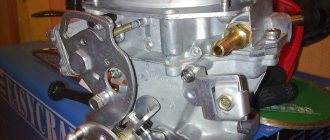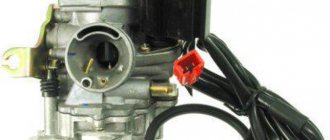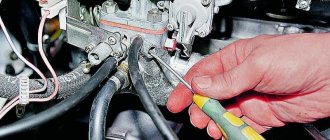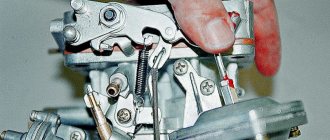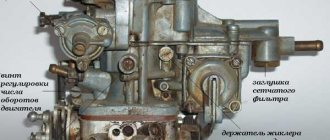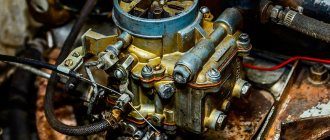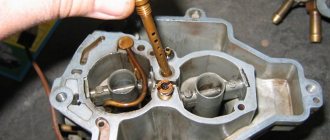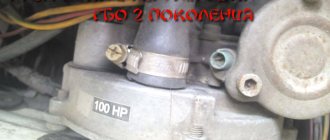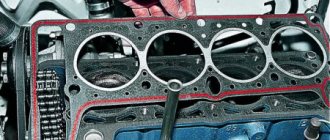The operational characteristics of vehicle power units are largely determined by the quality of the air-fuel mixture prepared and supplied by the carburetor. The equipment previously assembled at the Volzhsky Automobile Plant is no exception. If malfunctions occur in its operation, you often have to carry out maintenance and adjustment of the components yourself. Setting up the DAAZ 2107 carburetor with your own hands makes it possible to save money and quickly prepare the car for a trip.
The sponsor of this article is the website "Interior Design" - this is an information portal about the interior design of apartments and houses, new items, photos, videos, the best styles, options for the perfect combination and recommendations from professionals
Carburetor DAAZ 2107
Despite the fact that carburetor engines today are considered obsolete and vehicles coming off production lines are equipped with injection power units, the topic of operation and maintenance of all systems, including those providing the supply of a combustible mixture, will worry owners of old (and not so old) systems for a long time. auto. VAZ 2107 was produced from 1982 to 2012.
Cars of the classic AvtoVAZ series, including the “seven”, were equipped with different types of carburetors: DAAZ 2107, Ozone, Solex or Pekar. All of them belong to the float type of device, but differ slightly in design. These units are distinguished by reliability and long service life. The basic model installed at the plant is the DAAZ 2107 1107010 carburetor, which was produced and is today produced at the plant in Dimitrovgrad.
The carburetor on the VAZ 2107 has two modifications: 2107–1107010 and 2107-1107010-20. They differ only in the organization of management of the twentieth. The first model is equipped with a forced idle economizer. The second device contains an XX fuel jet, which has an electromagnetic shut-off valve.
Design Features
Structurally, the VAZ carburetor consists of a top cover, a body and a base. Each part has an internal filling that ensures a continuous supply of the combustible mixture.
The two-chamber unit is equipped with (main elements):
- float and mixing chambers;
- float;
- air and throttle valves;
- filter element;
- needle valve;
- throttle;
- jets of different types;
- diffusers;
- econostat;
- accelerator pump.
The structure of the VAZ 2107 carburetor is shown in the figure:
How the VAZ 2107 carburetor works:
Fuel enters the first float-type chamber, passing through the filter element. Its level is regulated by a float. Fuel jets are responsible for the movement of fluid. At the same time, the air mixture is supplied through the air jets, which is pre-cleaned by filter membranes. In wells and pipes, fuel is mixed with air. This highly flammable mixture enters the spray unit through the econostat, further enriched with air. Diffusers optimize its supply. The air-fuel mixture ends up in the mixing compartment. The throttle valve, controlled by the accelerator pedal, is responsible for supplying fuel to the engine cylinders.
When the engine is idling, the air-fuel mixture comes only from the first chamber of the unit. If the warmed-up engine operates at full power, fuel is supplied from the second compartment.
The operation of the carburetor is largely ensured by the condition of the jets and the cleanliness of other working parts. The 2107 carburetor is not fussy and is able to work even on fuel of questionable quality.
Evaluating all of the above, we can conclude that in a VAZ 2107 car, the carburetor is a very important component. It ensures the functioning of the power unit operating in various modes, starting a cold engine, idling, increasing speed and braking. If the DAAZ 2107 carburetor is configured incorrectly, this will immediately affect the dynamic characteristics, exhaust toxicity and fuel consumption.
Conclusion
As you yourself have seen, a carburetor is a complicated thing, but you don’t need any special intelligence to adjust the idle speed. Do not try to repeat the procedure if your “Seven” is on gas, the process will be pointless because the carburetor does not work with this type of fuel. You can try to set up the injector, but there is a high probability of only harming the device, since the actions described there are ineffective, so it is better to turn to professionals. All the procedures described and more are clearly demonstrated in the video, where the cheerful specialist easily and simply finds a common language with the carburetor. I wish the same for you, all the best!
Problems with the DAAZ 2107 carburetor
Despite the fact that the device is reliable and durable, units that are more than 30 years old are also in use today. During such a period of use, the likelihood that the car owner will encounter various kinds of problems is quite high.
What malfunctions are typical for Dimitrovgrad-made carburetors:
The engine stalls when you press the gas
At the moment of start or when idling, the power unit may stall when the driver smoothly presses the pedal.
Why does this happen:
- The holes in the transition system of chamber 1 may become clogged. They need to be blown out or treated with a cleaner.
- The accelerator pump is broken. It is replaced or repaired.
It is also possible that when moving while gas is supplied, the engine jerks and may stop. To prevent this, you urgently need to press the pedal again.
What does this mean:
- The channels, jets or emulsion well are clogged. The defect can be eliminated by cleaning the elements.
- The nozzle of the dosing system of chamber 1 is not screwed in completely. It needs to be wrapped.
- The jets are not selected correctly.
- The fuel level in the float chamber is insufficient, which is regulated by setting the float and valve.
- The filter installed at the inlet is dirty. It needs to be dismantled and cleaned.
- Poor condition of sealing elements that need to be replaced.
The ignition system may also be faulty.
Pouring gasoline
This problem is encountered quite often. Usually it lies in a malfunction of the metering units or the vehicle’s fuel system.
Causes of problems:
- malfunction or leakage of the needle valve;
- leakage or breakdown of the float;
- the float touches the walls when moving around the chamber;
- the fuel level in the float chamber is exceeded;
- the jets supplying air are clogged;
- fuel pump failure.
Knowing the design of the carburetor, it is not difficult to find the source of the problem.
Shoots
The power unit may shoot into the carburetor. Such pops can be heard both at start and when moving at speed. This leads to high fuel consumption, engine overheating, unstable idling, and also to the fact that the engine cannot develop full power. Shooting indicates improper adjustment of the fuel-air mixture preparation and gas distribution system.
Gasoline is not supplied
If fuel does not flow into the carburetor, there can be many reasons.
Main sources of problems:
- fuel filter contamination;
- ice formation in the gas pipeline;
- leaks at fuel line connections;
- interference in the hose that comes from the gas tank;
- fuel pump failure;
- contamination of the carburetor filter element.
The second camera does not work
In carburetors with two chambers, it is possible to increase the efficiency of the power unit while maintaining excellent power parameters. However, the 2nd compartment often fails.
The malfunction may be related to:
- flooding due to contamination of fuel channels;
- incorrect clearance settings;
- malfunction of the throttle valve drive;
- poor condition of the pneumatic drive diaphragm;
- failure of any elements: jets, diffuser, economizer XX, etc.
Accelerator pump does not work
Problems in the functioning of this unit lead to the fact that gasoline does not flow or is supplied under the wrong pressure, resulting in difficulties with acceleration. As a rule, the reason for the lack of fuel flow is a clogged fuel nozzle of the accelerator unit or a ball sticking to the check valve bushing. If the jet does not have enough pressure, you should pay attention to the condition of the ball and its position, as well as the leakage of the diaphragm connection, which is located between the top cover and the body. To fix the problem, you need to clean the components and evaluate their condition.
Setup with additional devices
Having obtained a multimeter and a gas analyzer, the adjustment results will be similar to those achieved by car service specialists.
- Adjust the correct ignition angle using a multimeter (connected to the distributor coil) and fix the distributor.
- We insert the gas analyzer into the exhaust pipe and start the car.
- Set the mixture quantity screw (indicated in the figure as number 1) in such a position that the crankshaft rotates within the range of 840-960 rpm.
- We look at the gas analyzer, if the CO value is exceeded, we adjust the quality of the mixture (number 2 in the figure).
- After this, the crankshaft rotation will decrease slightly, repeat step 3. The last steps are repeated until the values are at least a little similar to the factory values. To check, you need to sharply press the gas pedal several times and release it. When configured correctly, the speed increases smoothly and quickly, and is released automatically and without interruption.
Engine operation before and after adjustment
Preventive and regulatory measures must be carried out in a certain sequence.
Carburetor maintenance steps:
- external cleaning of the device;
- visual inspection of the unit, which may reveal some problems;
- dismantling and cleaning the mesh filter element (this must be done every 60 thousand mileage).
- cleaning air jets;
- if necessary: setting the XX, PU and float assembly.
As a result of such simple measures, the engine will start easily, there will be no interruptions in its operation, the car’s dynamic characteristics will improve, no dark smoke will be visible from the exhaust pipe, fuel consumption will return to normal, and the engine noise will decrease.
Of course, many types of car maintenance work are not so easy to do at home. However, this does not apply to the system for preparing and supplying the fuel-air mixture.
Knowing what the carburetor diagram looks like, the principle of its operation, as well as the installation standards for the main parameters, each car owner of a car on which the DAAZ 2022 is installed is able to carry out most of the work on adjusting and repairing the device independently. This allows you to save material resources and time that you have to spend on trips to the service.
Do-it-yourself dismantling of the unit
To remove the DAAZ 2107 carburetor, auto mechanics recommend proceeding in the following sequence:
- The hood of the car is opened, the clamp on the warm air intake hose is loosened using a flat screwdriver, after which the hose is disconnected from the thermostat tube.
The air intake hose is disconnected from the thermostat
The mounting plate of the DAAZ 2107 carburetor is removed manually
The air filter from the VAZ 2107 is removed after removing the mounting plate
The choke cable of the DAAZ 2107 carburetor is disconnected using a screwdriver
The hose for removing crankcase gases from the DAAZ 2107 carburetor is removed manually
The wires of the economizer control system are disconnected from the DAAZ 2107 carburetor without much effort
The hose of the vacuum ignition timing regulator is removed from the DAAZ 2107 carburetor by unscrewing the screws
The solenoid valve control hose is manually removed from the DAAZ 2107 carburetor
The return spring of the solenoid valve of the DAAZ 2107 carburetor is manually removed from the socket
Fuel hoses from the DAAZ 2107 carburetor are removed manually after loosening the clamps
The DAAZ 2107 carburetor mounting nuts are unscrewed with a 14-mm open-end wrench
After unscrewing the fasteners, the DAAZ 2107 carburetor is removed manually
Now let's look at how the carburetor works, ensuring the distribution of the fuel-air mixture:
- Acceleration pump.
- Econostat system.
- Maintains constant fuel level.
- Idle support.
- Support for engine starting and warming up.
- Jets (air and fuel), diffuser, VTS atomizer, well and emulsion tube are located in the main metering chamber.
The carburetor is adjusted after cleaning and assembly. Before you start disassembling and cleaning, I suggest you remember the main saying of any auto mechanic - “Don’t make a fuss while it’s quiet,” meaning that you shouldn’t get into a place where everything is in order or disassemble something that has nothing to do with the breakdown.
How to check the strainer
This is done as follows. Use manual fuel pumping and fill the float chamber with fuel, after which you will be able to see the shut-off valve close. Then move the top filter cover and remove the valve. It must be thoroughly washed in solvent, then dried using compressed air.
When the engine behaves incorrectly during loads, there are dips or loss of power, or the car “reacts poorly to the pedal,” most likely you have a problem with the fuel supply. In addition, often the cause is a faulty strainer.
Important! It is strictly forbidden to wipe the bottom of the float chamber using a fluffy or any other rag, since after such cleaning, invisible fibers may remain on the bottom of the chamber, which will clog your jets during operation.
You might be interested in: Replacing the fuel filter for Lada Kalina. Fuel pump repair: replacing the mesh
The float chamber is cleaned using a rubber bulb and then dried with compressed air.
Checking the tightness of the shut-off needle is carried out using a bulb, since the pressure force that occurs during squeezing is equal to the pressure in the fuel pump. When replacing the carburetor cover, you need to make sure that the floats are in the up position. You should feel strong pressure during installation, after which you need to listen carefully to the carburetor for air leaks. If there is even the slightest leak, the needle and valve body must be replaced.
